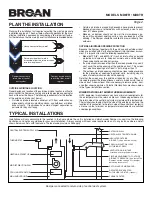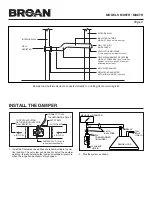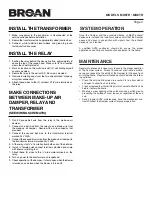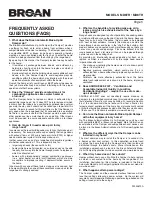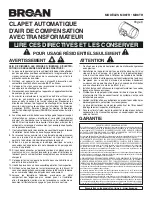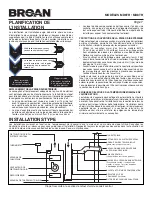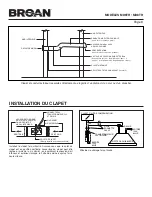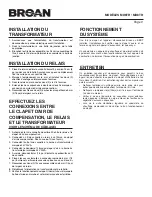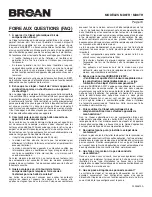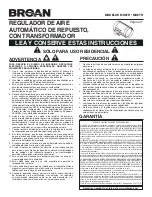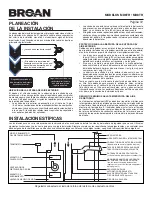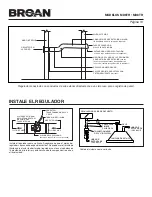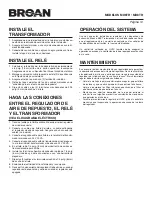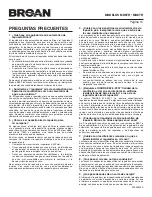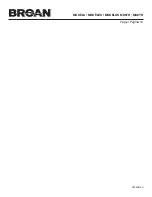
MODELS MD6TR • MD8TR
Page 5
FREQUENTLY ASKED
QUESTIONS (FAQS)
1. What does the Broan Automatic Make-Up Air
Damper do?
The Broan Automatic Make-Up Air Damper (the “Damper”) provides
a pathway for fresh air to enter a home from outdoors when a
compatible exhaust device is operating. The Damper opens when
a compatible BEST or Broan range hood is operating, thereby
creating a known, controlled point for fresh air to enter the home
while air is being exhausted from the building by the range hood.
By operating in this manner, the Damper provides two key benefits
for the home:
• It facilitates air exchange between indoors and outdoors, by
helping to allow fresh air into the home to replace air which is
exhausted out of the home.
• By allowing fresh air into the building when a compatible exhaust
device is on, the Damper helps to avoid negative pressure
conditions within the home which may interfere with the proper
operation of combustion equipment within the home.
Overall, the Damper let’s your Broan or BEST exhaust devices do
their job more effectively and without interfering with the proper
operation of other home systems.
2. Does the “Damper” provide combustion air for
combustion appliances like a water heater or
a furnace?
No. The Damper helps to replace air which is exhausted by a
compatible range hood. But it does NOT help to replace air which
is drawn from the indoors by a combustion appliance like a natural
gas water heater, and it should not be relied upon to perform this
function. One main reason for this restriction is that the Damper is
only open when the range hood that it’s connected to is operating.
So there is no assurance that the Damper would be open when
other appliances, like a water heater, are operating. Other means
must be provided to ensure adequate combustion air for these
appliances.
3. How do I know if I need make-up air for my
range hood?
In some cases the local building code may tell you that make-up air
is necessary. For example, some codes specify that range hoods
with exhaust flows of 300 cubic feet per minute (CFM) or higher
need a mechanical system to introduce make-up air.
In other cases, make-up air for a range hood is desirable regardless
of whether code requires it. This is especially true for:
• larger range hoods (those over 300 cfm)
• homes which are well air-sealed - so outside air may not be able
to easily find its way into the home through cracks, to replace air
which is exhausted out
• homes with atmospherically vented combustion appliances
(i.e. a water heater or natural draft fireplace), which are more
susceptible to improper venting if depressurization occurs in
the home.
In homes with any one of these factors make-up air is advised. And
in homes with more than one of these conditions make-up air for the
range hood is strongly advised.
4. What are the benefits of providing make-up air to
replace air which is exhausted out of the home by a
range hood?
Range hoods are designed to pull out pollutants like cooking odors
or moisture at the source, so they don’t linger in the home. Because
these fans pull air out of the house, this air needs to be replaced
with “new” air from outdoors. Normally this make-up air enters the
home through cracks and holes in the “shell” of the building. But
modern homes are air-sealed much more thoroughly so there are
not as many cracks and openings. Plus some exhaust fans like
range hoods exhaust a lot more air than can be replaced through
normal cracks in the building shell.
By providing an intentionally designed opening for fresh air to
replace air which is exhausted out by the range hood, several
important benefits result:
• The make-up air entering the home comes in at a known point,
where it is also filtered
• Negative pressure conditions, which could arise if air is
exhausted from a home without being replaced by new fresh air,
are prevented
• Pollutants are more effectively exhausted from the home
while fresh replacement air is drawn into the home, improving
ventilation
5. Does ASHRAE 62.2-2007 – “Ventilation and
Acceptable Indoor Air Quality in Low-Rise
Residential Buildings” – require the use of a make-
up air damper?
ASHRAE 62.2-2007 does not specifically require make-up air
dampers. In a few limited circumstances, this standard does require
that net exhaust flows from a house be limited. For example, Section
6.4 of the standard limits the net exhaust flow from a home’s two
largest exhaust appliances if the home has atmospherically vented
or solid-fuel burning appliances located within the pressure boundary
of the house. This standard is available at www.ashrae.org.
6. Can I use the Broan Automatic Make-Up Air Damper
with other equipment in my home?
No. The Broan Automatic Make-Up Air Damper may only be used
with compatible BEST or Broan range hoods. More information on
exact models of the Damper and compatible exhaust devices can
be found in the Broan Automatic Make-Up Air Damper Application
Guide.
7. What are the different ways that the Damper can be
installed in my home?
The most common way to install the Damper is to connect it to
a home’s central duct system. In this application, outside fresh
air enters the home through the Damper and is then routed and
distributed through the home’s ducts. More information on this
installation approach can be found in the Broan Automatic Make-
Up Air Damper Application Guide on our web site: www.broan.com.
8. What if my home doesn’t have ducts?
Homes without ducts can still utilize the Damper to help replace
air which is exhausted from the home by the range hood. An
installation illustration for this situation is included in the Broan
Automatic Make-Up Air Damper Application Guide on our web site:
www.broan.com.
9. What happens after a power outage?
The Damper system and the associated exhaust devices will not
lose their settings following a power outage. So the system will
resume its normal operation following a power outage, based on the
settings it used prior to the outage.
99044613A


